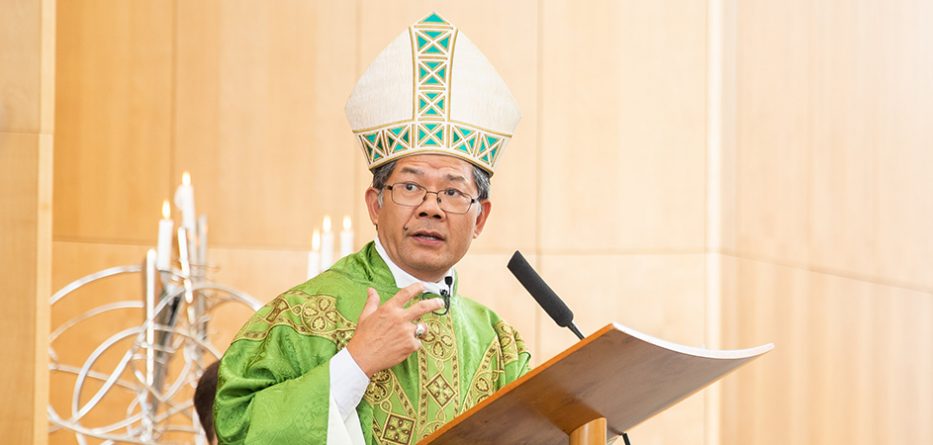Most Reverend Vincent Long Van Nguyen OFM Conv DD STL, Bishop of Parramatta
Homily for the Sixth Sunday of Easter Year C 2019 at Vigil Mass at St Madeleine Sophie Barat Parish, Kenthurst and at Holy Name of Mary Parish, Rydalmere
Readings: Acts 15:1-2; Apocalypse 21:10-14; John 14:23-29
26 May 2019
Open to the Holy Spirit leading us beyond known horizons
Dear sisters and brothers,
Responding to changes, especially unwelcome changes, is not always easy.
I am a Franciscan and one of the features of the Franciscan life was the call to be an itinerant or a pilgrim with no fixed address. When the call comes, we must be ready to let go of our familiar routines, environment and loved ones. Some people say in jest “join the religious life and see the world”. It is true for some of us some of the time. But the downside is that we must learn to let go of the past and begin again.
I think we are all reluctant to risk an unknown future. We are fearful of uncertainties and afraid to make the necessary adjustments. We resist anything that would infringe on our security and safety. Consequently, not only religious who find it difficult to uproot and replant ourselves in new soil.
Some of you young people, for example, may find it hard to let go the sheltered lifestyle in order to embrace new challenges. When I was called to be the bishop of Parramatta, I was overwhelmed by the sense of responsibility. I dreaded the prospect of being public figure under the spotlight. Yet the only way to growth and transformation is found in the ability to adjust to changes, the courage to face a new future and the faith to walk the unknown path.
The Word of God in this Sixth Sunday of Easter speaks of the profound changes that demand from us a duty of care, a deep discernment and a boldness of the spirit. We are challenged to allow ourselves to be led by the Holy Spirit beyond our limited horizons into deeper life, wholeness and truth.
The Acts of the Apostles has been telling us the story of the nascent Christian community. It has been a story of unity, cohesion and solidarity even in the face of external pressure and persecution. But as this tightly knitted group began to expand, they came face to face with an identity crisis that threatened to break them apart.
In this Sunday’s episode, we have a sense of the seriousness of this crisis and the politics of the early Church. On the one hand, there were those who wanted to protect the traditions concerning what it meant to be a believer. To them, the law of food and circumcision was fundamental to being in covenant with God. They had the majority on their side since the movement was still a Jewish affair.
Then on the other hand, there were others led by Paul who pushed the boundaries of Christianity. They challenged their fellow believers to a new understanding of what it meant to be in covenant with God. In the end, it was the collective and purposeful discernment through the Council of Jerusalem that catalysed the Church into a new era. The Christian movement would have been an irrelevant Jewish sect if it had responded to changes with fear and timidity.
In the Gospel, Jesus speaks to the disciples in anticipation of his departure. He reassures them that this should not be cause for anxiety. Instead, they should be glad because the Father will send the Advocate, the Holy Spirit to guide them and lead them into the fullness of life, truth and love.
Jesus calls us as he did his disciples to break loose from our comfort and security, from self-interested and enclosed living to a life open to the kingdom vision of integrity, solidarity and justice for all.
In him, we meet the God who pushes the boundaries of acceptance and love. In him, we are challenged to let go of our certitudes and securities, the habits, the routines, the patterns of behavior that are no longer relevant and life-affirming.
It was this call to deeper truth and justice that guided the early Church to grow beyond its Jewish confines. We must be likewise guided to respond to our own needs and changes today.
Brothers and sisters,
We are inspired by the way the first century Christians applied the teachings and examples of Jesus to their particular context. They responded not by fear and defence of status quo at all costs. Rather, in the face of new challenges, they modelled themselves on the radical inclusiveness, compassion and solidarity of the Master.
The Church was transformed beyond the original company that Jesus had gathered and yet this creative process remained faithful to his core values.
Our celebration today calls us to live our faith with creativity, discernment and courage. John dreams of the new Jerusalem after the city has been destroyed by the Romans. There is the sense in which the Church of old, steeped in self-security, triumphalism and power is dying.
We are called to be the new Jerusalem, the Church that shines with the light of hope, humility, mercy and service. This is the Church for the wounded Pope Francis is leading us towards. Let us pray that guided by a future to unfold before us, we may not be afraid to embrace the unknown pathways. May God of the journey accompany and form us into his people and his instruments for the transformation of the world.








